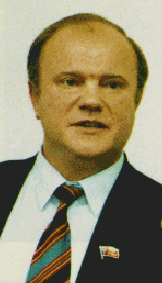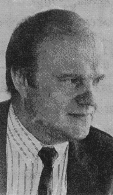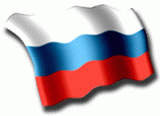


| 
| 
| 
| 
| 
| 
| 
| Your should understand that a clever propaganda worker
and a skilled politician will never talk in the same
language with different audiences. Gennady Zyuganov, 1995 |
Zyuganov was elected first secretary of a local committee, then of Orel City Committee, then of Orel Region Commitee of VLKSM. Since 1974, he held positions of secretary, then second secretary of Orel City Committee of the Communist Party, the Propaganda and Political Agitation Department Chair at Orel Region Committee of the Communist Party. Since 1983, an instructor, then a sector chair at the Department of Propaganda of the Central Committee of the CPSU.
Since 1989, the Vice Chairman of the Ideology Department of the CPSU. Zyuganov claims that his responsibilities included supervision over the Soviet nuclear program and gave him access to the so-called "special folder" with super-secret plans of actions that would be taken in cases of major emergencies. This claim is hard to verify, but is not entirely surprising: the Ideology Department used to poke its nose everywhere.
In 1990, Zyuganov played an active part in creation of the RSFSR Communist Party. He became a member of the Central Committee of the RSFSR Communist Party, then its secretary.
Since 1992, Gennady Zyuganov is the First Secretary of the Central Committee of the Communist Party of the Russian Federation (CPRF). He demonstrated his skills of an organizer by restoring the Communist Party from scratch and winning competition among the leftist movements. In December, 1995, the Communist Party of the Russian Federation won 22.30% of the party list vote and 34.89% of the Duma seats (157). Their faction is the largest in the new Duma. Their allies, Agrarian Party, Nikolai Ryzhkov's Power to the People, and Women of Russia bring in 32 more seats.
 | Gennady Zyuganov described the parliamentary election results as a vote of no-confidence in the Chernomyrdin government. According to Zyuganov, as in October 1917, Russia stands at a crossroads, facing an unpopular war, the absence of fair land reform, ethnic conflicts, and inadequate state regulation of the economy. As in 1917, Zyuganov writes, the "reactionary-bureaucratic" path of development has been exhausted, and Russia must now turn to a "revolutionary-democratic" path. Drawing on Lenin's approach to similar problems, the current Communist leader advocated the following steps to achieve a "peaceful revolution": changing economic policy "to stimulate production"; "restoring property rights to labor collectives"; establishing legislative control over the executive branch; and "restoring the independent international position and true sovereignty of Russia," which Zyuganov says would involve reviving a union of some former Soviet republics "on a voluntary basis." |
According to the November 29, 1995, issue of Segodnya, Gennady Zyuganov said that the reintegration of former Soviet republics has "extraordinarily large significance" for his party. He says he favors quick economic union with Ukraine, Belarus, and Kazakhstan and adds that Russia can unify with other republics as soon as its economy starts to improve. The Communists propose only one condition for cooperation with the Caucasus regions of Russia: "a thousand-year treaty banning secession".
In his book "Beyond the Horizon", published in 1995, Zyuganov writes, "Perceptions, culture, and ideology of the Western world are more and more significantly affected by Judaic diaspora, whose influence is consistently growing by the day, even by the hour." His convoluted prose echoes the stereotypes and conspiracy theories prevalent in traditional anti-Semitic tracts: "The Jewish diaspora, which traditionally controlled the financial life of the continent, began expanding its own market by becoming the bearer of the controlling packet of shares in the complete industrial-economic system of Western civilization." Zyuganov goes on to emphasize the "special meaning" therefore acquired by "Slav civilization represented by the Russian Empire that became the last opponent of Western hegemonism".
In his article "Back to the Future" published in the New York Times on February 1, Zyuganov hinted that Russia will not be democratic if he becomes president: "We respect your democratic traditions and outstanding achievements. [...] Recognizing the uniqueness of the American experience, we insist on acknowledgment of our equal right to follow our own path in accordance with our traditions and conditions." He also promised return to the imperialist foreign policy: "Our foreign policy priority would be to maintain continuity with the foreign policies of pre-revolutionary Russia and the Soviet Union. We would seek to restore our state's unique role as the pivot and fulcrum of a Eurasian continental bloc - and its consequent role as a necessary balance between East and West." In the meanwhile, Zyuganov implied that Russian Communists would like to follow the path of Red China in economy and politics: "Above all, we would concentrate on internal healing and national rebirth. [...] We are deeply interested in expanding economic cooperation and educational, scientific and cultural exchanges. We are ready to guarantee American investments and to create better conditions for them than now exist."
On February 27, 1996, Zyuganov spoke at a meeting between a delegation from Russia's State Duma and students and instructors of the International Relations Institute in Kiev. Russia has no right to "make big geopolitical mistakes," Zyuganov said. "There are attempts to involve us into a squabble with Ukraine, and this is inadmissible," he declared. "We must also do all we can to prevent clashes between Orthodox Church members and Muslims, and aggravation of relations with China."
With reference to the problem of Russian speakers in the Crimea Zyuganov said that the faction he leads wants to make "the approaches of Moscow, Kiev and Simferopol to the processes taking place now as close as possible, and to have the rights of our compatriots protected and restored in accordance with international norms without infringing on anyone's sovereignty."
As for the restoration of peace in Chechnya, there is a need to form an interdepartmental commission to resolve this problem, appoint one of the deputy prime ministers to monitor its work, convene the Congress of Caucasian Peoples for a conference, take urgent steps to prevent arms for criminal or mercenary groups from reaching the area, and gradually withdraw the army from places "where the situation is relatively calm," Zyuganov said.
Western investors are concerned about prospects for doing business under communism, but Zyuganov, comparing Russia to communist China, said they had nothing to fear. However, in the same breath, he belittled their importance to the Russian economy in the past five years. ``They invested more in one region in China in five years of reform than in the whole of Russia, Belarus and Ukraine. They're not scared of the communist government there,'' Zyuganov said in April, campaigning in Samara, where at least 3,000 people squeezed into a meeting hall and filled the street outside, straining to hear his voice over a loudspeaker.
In a May 12 interview with the Russian TV (RTR) weekly analytical program "Zerkalo," Gennady Zyuganov revealed the main points of his economic program. Although the free market is "a natural and normal phenomenon" that is 7,000 years old, an unregulated market is unsuitable for Russia, he argued. Zyuganov added that he supports various forms of property ownership, including private, although he said he gives priority to the "public property forms" that take into consideration Russia's "national character." He said the state should own a controlling share in various sectors of the economy, including energy, transport, military industry, education, and science. However, Zyuganov declared that there will be no forced renationalization, and only loss-making enterprises may have their privatization reversed. Nevertheless, during a recent campaign swing through St. Petersburg, Zyuganov said he agrees with scholars who say the optimum balance of state and private property in an economy is 61% to 39%, respectively.
In an interview with the opposition weekly Zavtra (no. 17), Zyuganov declared that national culture and morals are being deliberately destroyed in Russia. He advocated more funding for and state control over the development of Russian culture, and proposed introducing censorship of films, books, and advertisements imported from abroad. In addition, Zyuganov argued that a "public council" for television should be instituted, which would consist of prominent scholars, writers, and priests. The council would oversee television schedules and reduce the number of programs featuring money, murders, and pornography, which Zyuganov said are the only things currently shown on television. Speaking about the enormous role of the Russian Orthodox Church in Russian culture and politics, Zyuganov advocated placing restrictions on foreign religious groups, which he said are encouraged by the current authorities.
An initiative group nominating Gennady Zyuganov for president was formed on January 9, 1996, in Moscow. Valentin Chikin and Alexander Prokhanov, the head editors of Sovetskaya Rossiya and Zavtra, joined the group; Chikin called Zyuganov "an absolutely irreproachable person morally, a bold strategist and a skillful tactician." Prokhanov has in the past called for all communist and nationalist forces to unite their efforts against the current regime.
A closed January 12 plenum of the Central Committee of the CPRF officially postponed a decision on nominating a presidential candidate until a February 15 party conference. However, ITAR-TASS reported that the committee members decided to back Gennady Zyuganov.
The Agrarian Party will back Gennady Zyuganov in the presidential elections, party leader Mikhail Lapshin announced on January 29, 1996. On February 1, Oleg Shenin, chairman of the Union of Communist Parties-Communist Party of the Soviet Union, gave Zyuganov's candidacy his blessing, Ekho Moskvy and Russian TV reported. Like Viktor Anpilov's Labor Russia, which has also endorsed Zyuganov, Shenin's party is small, but its support reduces the chances that a far-left candidate will split the communist vote in June.
On February 15, 1996, a conference of the Communist Party of the Russian Federation nominated Gennady Zyuganov as the party's presidential candidate.
The Day of Defenders of the Fatherland, formerly Soviet Army
Day, was marked on February 23 by various events held throughout
Russia. Some 5,000 communist-patriotic hardliners marched in Moscow
and were addressed by Gennady Zyuganov. Zyuganov denounced
The Central Electoral Commission has registered Gennady Zyuganov as the first candidate for the June 16 presidential elections on March 4. Zyuganov may now officially begin campaigning and may collect money from the electoral commission, which will be allocated to all registered candidates. Along with a list of 1.7 million signatures supporting his candidacy, Zyuganov submitted tax returns for the last two years to the commission, declaring his total pre-tax income for 1995 at about 30 million rubles ($6,300). The same day, representatives of 25 left-wing groups, including Agrarian Party leader Mikhail Lapshin and Power to the People head Nikolai Ryzhkov, formed an electoral "bloc of popular patriotic forces" and signed an agreement supporting Zyuganov as their sole presidential candidate. However, some hardliners including Viktor Anpilov's Workers' Russia, the Russian Communist Workers' Party, and Sergei Baburin's Russian Popular Union refused to sign the document because it does not call for a restoration of the Soviet Union. Zyuganov said he still hopes to cooperate with politicians such as Alexander Rutskoi, Alexander Lebed, Svyatoslav Fedorov, and Stanislav Govorukhin, all of whom agreed last week to form a "third force" supporting neither Yeltsin nor Zyuganov for president. Later, Zyuganov picked up the endorsements of Anpilov, Union of Officers head Stanislav Terekhov, and former vice president Alexander Rutskoi.
Zyuganov has called for a revision of Yeltsin's ambitious privatization program, which has put huge chunks of state property into private hands but has created a class of wealthy businessmen widely despised by workers.
Zyuganov unveiled his election program at a March 17 rally in Moscow, Russian and Western agencies reported. If he comes to power, Zyuganov promised among other things to guarantee all citizens the right to work, increase wages and pensions, compensate those whose savings were eroded by inflation, end the war in Chechnya, strengthen the ruble, and establish a state monopoly on trade in goods "of strategic significance" within a "mixed economy." He denounced the Belovezhsk accords that brought an end to the USSR but promised not to "threaten anyone's sovereignty" if he were elected. Like the KPRF election platform approved before the Duma elections, Zyuganov's platform does not contain the words "Leninism," "communism," or "nationalization."
In early April, Zyuganov campaigned in Smolensk, where he addressed a egg-factory workers with a giant portrait of Lenin as a backdrop. Private property, he said, should be limited to garden plots, just as it was in Soviet times. He advocated a return to strong state control of the economy and indicated he would limit the availability of foreign goods, which dominate the shelves of Russian stores. ``The social democracy of the Western European style has no chance of success in Russia,'' Zyuganov said.
Zyuganov finished second in the first round (32%), behind Yeltsin (35%). The two will meet in the runoff (June 30 or July 7).
 Back to Russian Presidential Elections-96 page.
Back to Russian Presidential Elections-96 page.